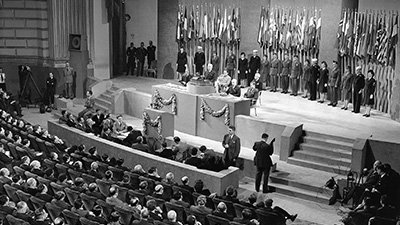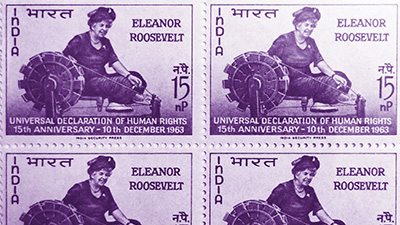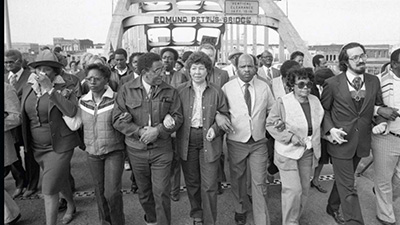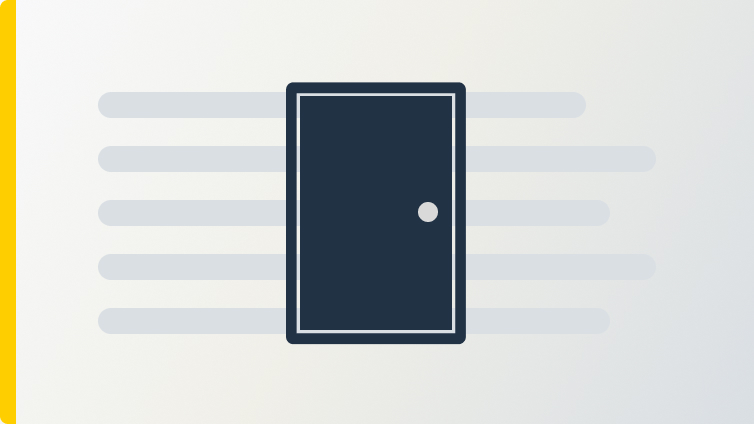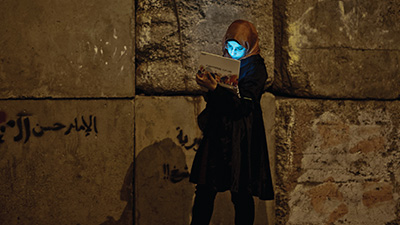Global Communities
Driving Question: Why did ideas about human rights change after 1945?
It’s time to join the conversation about human rights and global cooperation. Explore how global institutions and grassroots movements have worked together—and at times clashed—in the fight for justice since World War II.
Learning Objectives:
- Use evidence to analyze how human rights emerged and changed in the past century.
- Use the historical thinking practice of comparison to evaluate different rights documents.
Vocab Terms:
- globalization
- human rights
- injustice
- institution
- non-governmental organization
- regulation
- universal
Opener: Global Communities
To teach this lesson step, refer to page 2 of the Lesson 9.5 Teaching Guide.
What are rights and where do they come from? These questions will help you prepare to learn about global communities.
The United Nations
To teach this lesson step, refer to page 3 of the Lesson 9.5 Teaching Guide.
Check out our Reading Overview to learn about the Three-Step Reading approach.
After World War II, global leaders realized that peace and justice needed more than good intentions—they needed structure. Check out how international institutions were created to prevent future conflict and promote cooperation across borders.
-
Guiding Questions
-
Before you read
Preview the questions below, and then skim the article. Be sure to look at the section headings and any images.
While you read
Look for answers to these questions:
- Why was the United Nations created after World War II?
- What are some key goals of the United Nations?
- What do some of the other international institutions focus on?
- Why are some people critical of international institutions?
- How do these institutions try to protect human rights?
After you read
Respond to these questions: Do you think global institutions like the United Nations are effective in promoting peace and human rights? Why or why not?
Human Rights
To teach this lesson step, refer to page 4 of the Lesson 9.5 Teaching Guide.
Help students through feedback by evaluating this assignment using the Comparison Feedback Form.
What does it mean for a right to be universal? In this part of the lesson, you’ll examine how the idea of human rights took shape after 1945, and why defining and protecting those rights has been a global challenge ever since.
-
Guiding Questions
-
Before you read
Preview the questions below, and then skim the article. Be sure to look at the section headings and any images.
While you read
Look for answers to these questions:
- Why was the Universal Declaration of Human Rights created?
- How was the UDHR used by oppressed people after it was signed?
- What is a major challenge in making human rights universal?
- What do cultural relativists argue about human rights?
- How has globalization both supported and threatened human rights?
After you read
Respond to these questions: Is the idea of human rights enough to protect people in today’s globalized world? Why or why not?
Connecting Rights Movements
To teach this lesson step, refer to page 10 of the Lesson 9.5 Teaching Guide.
Have your students use the Three-Step Reading process as your students unpack these articles. Check out the Three-Step Reading Worksheet to get them going.
The fight for human rights doesn’t stop at national borders. In this step, you’ll explore how civil rights movements in the United States inspired and connected with similar struggles across Latin America.
-
Guiding Questions
-
Before you read
Preview the questions below, and then skim the article. Be sure to look at the section headings and any images.
While you read
Look for answers to these questions:
- How did World War II influence the civil rights movement in the United States?
- What impact did civil disobedience campaigns have in the US in the 1950s and 1960s?
- What US civil rights ideas spread to Latin America?
- How were Black and Indigenous movements connected in Latin America?
- How did racial justice movements relate to gender equality?
After you read
Respond to this question: How do global networks help explain the spread of racial justice movements after 1945?
Closer: Global Communities
To teach this lesson step, refer to page 11 of the Lesson 9.5 Teaching Guide.
Pardon our dust while we remodel. The global community has sought to improve human rights since 1945, but many struggles are still a work in progress.
Connected or Divided?
To teach this lesson step, refer to page 11 of the Lesson 9.5 Teaching Guide.
We’re more connected than ever—but what does that mean? This step explores how digital networks and social media are shaping identity, activism, and the future.
-
Guiding Questions
-
Before you read
Preview the questions below, and then skim the article. Be sure to look at the section headings and any images.
While you read
Look for answers to these questions:
- How have knowledge networks changed since 1969?
- How does social media help people connect?
- How has social media helped people organize?
- What are some risks or downsides of social media?
- How has the internet affected identity and activism?
After you read
Respond to these questions: In your experience, has the internet made you feel more connected, more isolated, or something in between? Why?


